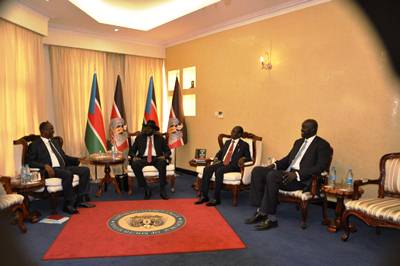South Sudan rejects proposition to appointment four vice-presidents
February 15, 2018 (JUBA)- A South Sudanese presidential advisor on Thursday has rejected a proposal by the IGAD mediation team providing to appoint four deputies for President Salva Kiir, saying it would make the decision-making process difficult.

“This will be a new precedent but I think it will not work here in South Sudan if it has worked elsewhere. In fact, I don’t know of a country which has had four deputies to a president, not even Sudan where there were conflicts in the South, in the east and Darfur. There were at least two vice presidents and only assistants to the president,” Gatluak further said.
The presidential aide was reacting to a proposal to reshape the presidency by the Intergovernmental Authority on Development (IGAD), suggesting that President Kiir will remain the head of the transitional government with four deputies.
The East African regional bloc through its mediation said the expansion of the executive to allow the appointment of the four deputies during interim period would enhance inclusivity in the government.
After Sudan’s independence in 1956, the role of head of state was filled by a five-member Sovereignty Council, in order to represent the rival political factions and at the same time to have a representative for southern Sudan at the presidency.
However, the collegial presidency was only implemented during the three democratic governments. The military governments established a presidential regime.
The president, according to the proposal, shall serve as the president and executive head of state for a transitional period of 36 months, preceded by 120 days of a pre-transitional period.
It also proposed that the four vice presidents shall oversee the clusters of the Council of Ministers, and generally to supervise the implementation of the reforms outlined in the peace agreement.
“During the Transitional Period, responsibility for governance shall be shared between the current Transitional Government of National Unity, on the one hand, and the parties and entities outside of the Incumbent TGoNU (“the South Sudan Opposition”) on the other hand, as collectives,” reads the draft document.
It distributed the power-sharing ratio in a way that gives the government 51% for and 49% to various political dissidents and opposition to the government.
The document proposed treating Former Detainees as individual leaders for the purpose of allocation of responsibility. The group, according to the draft, will be eligible for positions and may nominate two (2) representatives to serve as ministers, and 1 as a deputy minister in the coalition government.
“The Council of Ministers shall comprise 32 ministries. Incumbent TGoNU (Transitional Government of National Unity): Fifty-one percent (51%) of ministerial portfolios (15) to be nominated,” it reads.
“Sudan People’s Liberation Movement/Army-In Opposition (led by Dr Riek Machar): twenty-eight percent (28%) of ministerial portfolios (9 ministers),” adds the proposal. “Other Armed Groups: twelve percent (14%) percent of ministerial portfolios (4 ministers).” Two ministers will be nominated by the Former Detainees while other political parties will take 7% of ministerial portfolios and will nominate 2 ministers.
The power-sharing ratio in a State within the former States of Jonglei, Unity and Upper Nile as determined in the peace agreement, should be 46% for the incumbent, government, 40% for the armed opposition groups, 2 Former Detainees and opposition parties in the remaining power-sharing percentage.
The same ratios apply to other states with a significant presence or influence of opposition groups, including states within Equatoria and Bahr Ghazal.
Power sharing in states gives the incumbent government 70% and 30% for the opposition. “The allocation of the South Sudan Opposition shall be shared among the armed and unarmed opposition in accordance with the actual presence or influence of a party or entity within the State concerned,” it notes.
The draft proposed that the parties will hold elections 60 days before the end of the transition period in order to establish a democratically elected government.
(ST)
